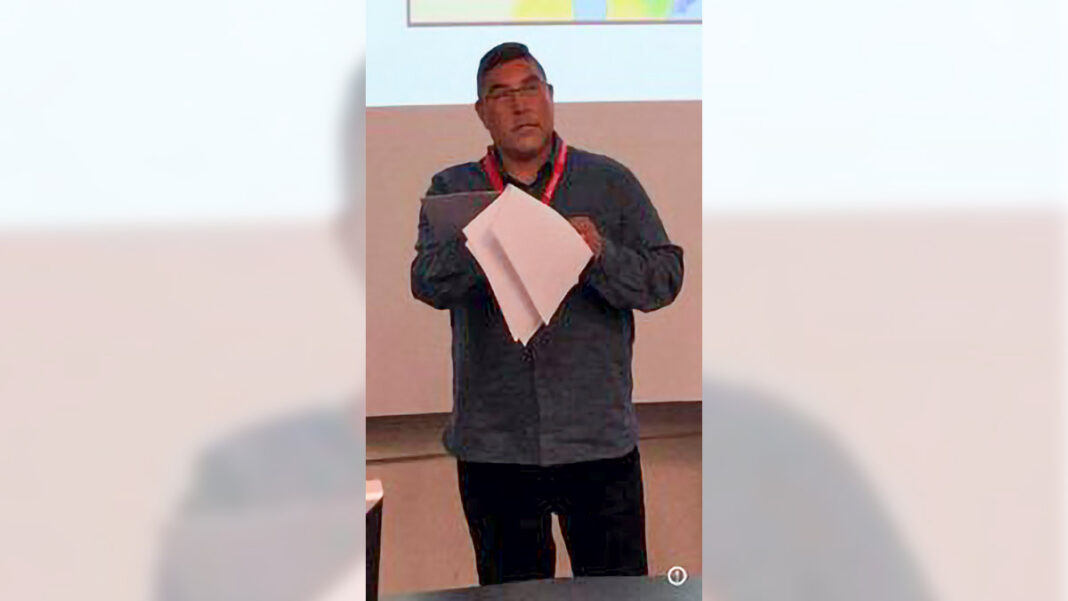LITTLE CURRENT—Josh Manitowabi has followed a long and winding road, from working in his father’s sawmill operation to teaching and research positions while scouting out a career path. Recently, Mr. Manitowabi got some very good news.
“I just got a tenure track position at Brock University in their history department as a Professor of Indigenous History,” he told The Expositor, noting the newly-created position is “part of their mandate to Indigenize their institution—part of the Truth and Reconciliation Commission hires.”
Getting to this point in his career path has involved a lot of hard work and study, but Mr. Manitowabi is no stranger to hard work. “I used to work in forestry with my father,” he recalled. “He had a small logging business and I started working with him when I was 15 years old.”
By the time he had reached his 30s, Mr. Manitowabi still wasn’t sure what he wanted to do, but he knew it was not logging. “My aunt had encouraged me to go back to school,” he said. When asked what he wanted to be, his response was “a history teacher—an anthropologist.”
So, in 2012, Mr. Manitowabi enrolled in an Indigenous Studies program at Laurentian University, before transferring to Michigan University where he graduated with a BA in 2015. On a roll, he was then encouraged to continue on to a Masters program.
“My interest is in history from an Anishinaabe perspective,” he said, and he has worked on pairing Indigenous knowledge with settler records. “I began looking at education in a different way,” Mr. Manitowabi noted. The elders and knowledge keepers he was interviewing generally had little in the way of formal education, but proved to be a font of knowledge in their own right-nonetheless, having grown up in the bush. “I found it interesting what people thought education was,” he said.
As time went on, Mr. Manitowabi realized that he really wanted to be a university professor, researching Indigenous history and anthropology. “It was a way that I could be working for my people,” he said. Mr. Manitowabi set his sights on working on his PhD.
Then came a job opportunity advertised by Brock University.
Mr. Manitowabi discovered that this was to be an entirely new position, with a strong interdisciplinary component. “They were looking for an Indigenous person with a PhD,” he said. Although he was still working toward his doctorate, Mr. Manitowabi applied and was successful in securing the position.
“The university was very good,” he said. “They allowed me to delay my start to give me time to work on my thesis.”
His tenure track position will involve 40 percent teaching (four courses), 20 percent volunteer work and “40 percent researching anything I like.” Mr. Manitowabi will be creating the coursework for the classes and field of study for his program—essentially a teacher’s dream job.
He plans to explore Indigenous ways of knowledge and linkages to settler records, not just among the Anishinaabek, but also in other Indigenous populations around the world. “There are similar situations in New Zealand, Australia, Asia and Africa,” he noted. “I will be helping to define Indigenous knowledge, what is it? How is it being used today? What it looks like.”
The records of British, French and other colonial powers will be assessed through an Indigenous lens.
“This will also involve cartography,” noted Mr. Manitowabi. “British and French maps and how they are developed.”
An oral tradition from Mr. Manitowabi’s own family illustrates the importance of the work he will be doing. When the 1862 Treaty that allegedly surrendered Manitoulin Island for settlement was being negotiated, one of his ancestors was among the leading men of Wiikwemkoong. “My mother recalled that my great great grandfather never touched alcohol,” he said. The negotiators arranged a big party in Manitowaning for the Indigenous leaders over the weekend and alcohol was one of the attractions on offer. With more interest in what was happening at home in Wiikwemkoong with his family, Mr. Manitowabi’s ancestor went home for the weekend. When the Wiikwemkoong leaders returned, much of Manitoulin had been ceded to the Crown, but not Wiikwemkoong—which remains proudly unceded territory to this day.
Mr. Manitowabi’s passion for history and anthropology was ignited by his initial curiosity, and that passion has led to a dream career as an educator. Mr. Manitowabi said he was grateful for the pathfinders who went before him, individuals such as Basil Johnston and Cecil King whose works he studies today. “Basil Johnston’s archives are held at McMaster University,” he said.
Mr. Manitowabi began his journey to a tenure track career at Brock University by following his dreams—a modern day vision quest, if you like—but he points out he first set foot on his path later in life than some. It is never too late to start that journey, suggested Mr. Manitowabi, who encourages people to seek out their own paths.
“There are still not a lot of Anishinaabe PhDs,” he notes, adding that in a burgeoning field of study, “there is still plenty of room.”




